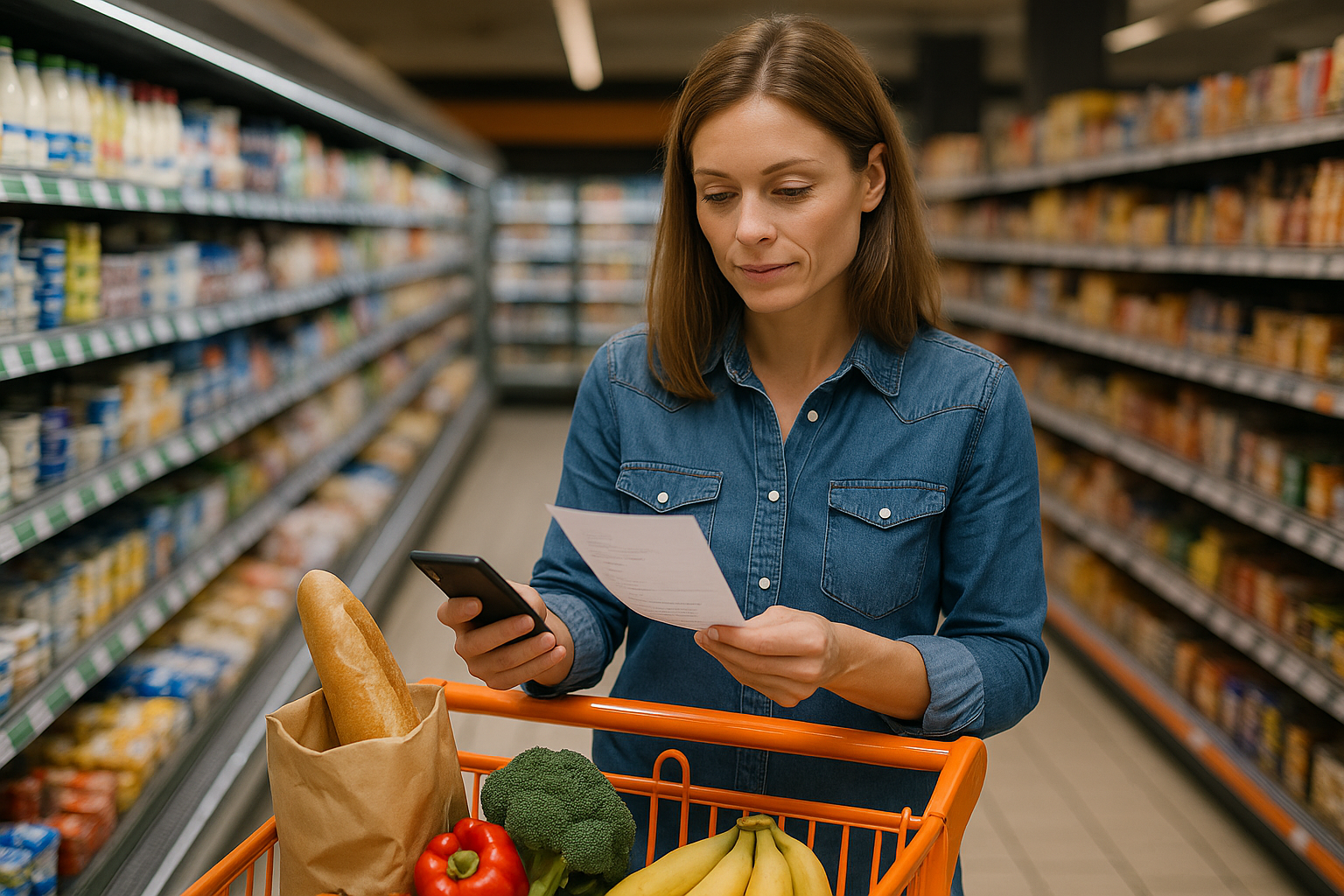Grocery shopping is a basic necessity for every household, but it’s also one of the most significant monthly expenses. Many consumers don’t realize how much they could save simply by adopting a few smart strategies before and during their trips to the store.
With inflation rising and the cost of living climbing, learning how to save on groceries has become a critical skill for anyone trying to manage their budget.
In this comprehensive guide, you’ll discover proven ways to reduce spending without compromising the quality of your meals or household products.
Understand Your Shopping Habits
Before you can save, you need to understand what you’re spending on. Reviewing your past grocery receipts can help reveal patterns—especially on non-essential items.
Look closely at what you buy most often. Are there snacks or convenience foods that aren’t really necessary? Cutting back on these can lead to instant savings.
Always Make a Shopping List
Going to the supermarket without a list is one of the biggest causes of impulse buying. A written or digital list helps keep your focus and prevents unnecessary purchases.
Make your list based on a weekly meal plan. This helps avoid overbuying and ensures you use what you purchase, minimizing waste.
Don’t Shop Hungry
It may sound trivial, but shopping while hungry significantly increases your chances of buying food you don’t need—especially snacks, sweets, and ready-made meals.
Have a snack or light meal before heading out. It helps you stick to your list and make better choices.
Compare Prices Between Stores
Prices for the same item can vary greatly from one store to another. Comparing prices—either by visiting different stores or using price comparison apps—can save you a surprising amount of money over the course of a month.
Many stores also release digital flyers with weekly deals. Review them before planning your shopping trip.
Buy in Bulk (Wisely)
Buying in bulk is a great way to save—when done correctly. If a product you regularly use is on a good promotion and it doesn’t expire quickly, it’s worth stocking up.
Avoid bulk-buying perishable items unless you have a plan to freeze or consume them quickly. Otherwise, it leads to waste instead of savings.
Use Coupons and Cashback Apps
Take advantage of digital coupons offered through apps or websites. Some supermarkets also have loyalty apps with exclusive discounts.
Additionally, use cashback apps that give you a percentage of your spending back. Combining discounts and cashback maximizes your savings.
Choose Store Brands Over Name Brands
Store-brand products (also called private label) are often just as good in quality as national brands but significantly cheaper.
Items like pasta, rice, canned goods, paper towels, and cleaning supplies can be bought as store brands without sacrificing quality.
Pay Attention to Unit Price
Don’t be fooled by package size or price tags. The best way to compare value is by checking the unit price (price per kilogram, liter, or ounce), which is usually listed on the shelf label.
This helps you identify the most cost-effective option, regardless of packaging.
Avoid Last-Minute Shopping
Emergency trips to nearby convenience stores or corner shops almost always cost more. These stores are convenient but rarely competitive in pricing.
Plan to do one major shopping trip per month and smaller weekly runs only when necessary.
Limit Processed and Prepackaged Foods
Pre-made meals, frozen snacks, and packaged goods are often more expensive—and less healthy—than homemade alternatives.
Cook from scratch when possible. Preparing meals in batches and freezing portions is a great way to save time and money.
Join Loyalty and Rewards Programs
Many supermarkets have loyalty programs where you can earn points and redeem them for discounts or free products.
Joining is usually free, and frequent shoppers benefit the most over time. It’s worth signing up at stores you visit regularly.
Don’t Be Fooled by Marketing Tactics
Supermarkets are designed to make you spend more. From calming music and colorful packaging to placing high-margin items at eye level, everything is carefully arranged to influence your decisions.
Stick to your list, and be cautious with impulse items, especially those near the checkout line.
Shop at Local Markets and Discount Stores
Farmers’ markets and local produce shops often have better prices on fresh fruits and vegetables. Plus, you’re supporting local businesses.
Use the supermarket for packaged goods and staples, and shop for produce where it’s freshest and cheapest.
Learn to Store and Freeze Food Properly
Buying items on sale is great—but only if you can store them safely. Make use of your freezer for meats, vegetables, and even some breads.
Label items with the date and rotate your stock to use older items first. This prevents waste and lets you take full advantage of bulk deals.
Set a Monthly Grocery Budget
Decide on a maximum amount you want to spend on groceries each month. Divide it by weeks to help manage cash flow.
Track your spending using budgeting apps like YNAB, Mint, or a simple spreadsheet. Awareness is key to improving spending habits.
Avoid Using Credit Cards for Groceries
Paying for groceries with a credit card may seem convenient, but it’s easy to overspend and harder to keep track.
Use debit or cash when possible to keep your grocery budget on track. Reserve credit cards for emergency or high-reward purchases only.
Don’t Bring Extra People on Shopping Trips
Shopping with kids—or even other adults—can increase your spending due to requests, distractions, and added impulse purchases.
If possible, shop alone, with a clear plan, and a time limit. The faster you’re in and out, the less likely you are to deviate from your list.
Plan Meals in Advance
Meal planning prevents the need to constantly ask “what’s for dinner?” and reduces the temptation to order takeout.
Plan your meals around what’s on sale that week. If chicken is cheaper than beef, build your meals accordingly.
Final Thoughts: Saving on Groceries Is About Smart Habits
Saving money at the grocery store doesn’t mean sacrificing your lifestyle or cutting essential items. It’s about being strategic, mindful, and informed.
By applying these tips consistently, you’ll see a noticeable drop in your monthly grocery bill. Better yet, you’ll feel more in control of your finances—without ever feeling like you’re missing out.

With over two decades of experience in the tech world, the author of Promoção InternetFibra is passionate about helping people improve their home internet. He specializes in networks, equipment, and performance optimization, turning complex tech topics into simple, practical advice. His mission is to make reliable, high-speed internet accessible for everyone.
